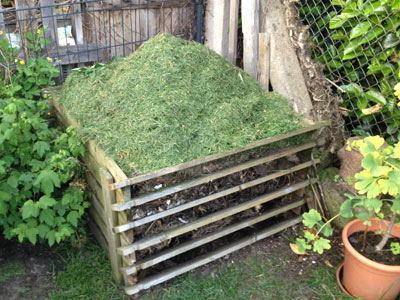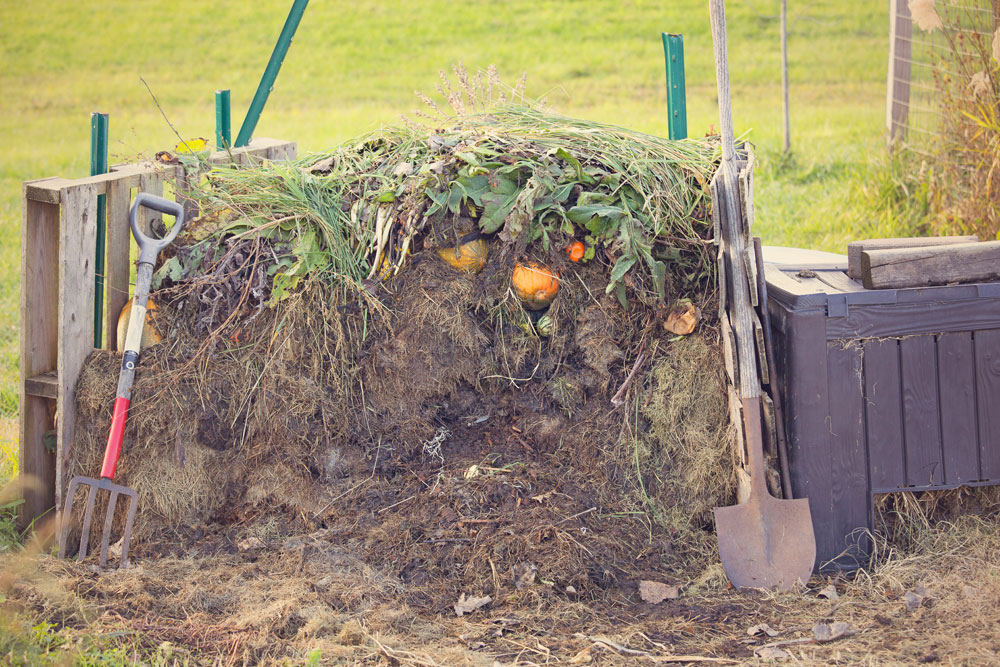Not all waste is suitable for composting in the home garden. Compost cannot replace organic waste. We explain how you can specifically compost your valuable kitchen and garden waste to produce natural fertilizer. The crucial question: What belongs on my compost, what does not? Here you will find all the information at a glance.
Organic waste is excellent for composting all year round. What waste can you put on the compost pile or in the composter?
Contents
Composting waste – what can be put on the compost:
- Raw vegetable and fruit scraps – but no citrus fruit scraps!
- Egg shells
- Withered flowers or herbs – Cut longer stems and thicker plant parts into small pieces, this speeds up composting.
- Lawn clippings (ideally these should already be slightly dried, otherwise there is a risk of rotting).
- Small amounts of newsprint and cardboard (no colored paper, no glossy materials, so paper that rots well)
- Tea and coffee grounds
- Leaves and shrubbery cuttings. Tip: Shrub clippings also turn into humus more quickly if they are chopped up beforehand.
- Small amounts of manure from pets (but NO additives such as cat litter – exclude chemical ingredients).
- Algae from the garden pond
- Larger twigs, branches, roots and coarse clippings will loosen up the compost, but should be cut small beforehand, as they rot very slowly.
- Nut shells – walnuts, hazelnuts, but also peanut shells – also rot slowly, so only add them in doses and chopped up.
- Hardly rotting foliage should only be added in small quantities, such as the foliage of walnut and chestnut trees, oaks or plantains.
What not to put in the compost:
- Cooked food or prepared food – especially not meat and other protein foods – These food scraps attract rats and other animals!
- Neither should fatty foods, oils, milk – these substances do not decompose easily.
- Plant debris that is infested with mold or a fungus – use your organic waste garbage can for this. In this way you will avoid possible further spreading.
- Ash residue – the ash can be contaminated with pollutants, plus larger clumps of ash decompose very slowly.
- Citrus fruit residues, as these are often heavily sprayed and so pesticides get into your humus. So lemon peel, orange peel, best to avoid pineapple and banana peel as well. In small quantities or as organic products, the addition of tropical fruits, such as also watermelons or other melon peels on the compost should not be problematic.
- Cut flowers, especially if they were bought in the supermarket – they often contain pesticides.
- Avoid leaves and components from the cherry laurel bush, the plant is very toxic and the leaves rot slowly.
- Colored or thick paper and cardboard waste does not belong on the compost heap.
- Do not put weeds that already bear seeds on the compost. This will prevent them from spreading further.
Why composting waste is so useful

The rotting of kitchen and garden waste on your own compost has several advantages. On the one hand, the leftovers are put to good use. Secondly, the organic waste is turned into valuable, nutrient-rich humus. This means you don’t have to spend extra money on fertilizer. And: The production of this own fertilizer costs you nothing. Neither expensive gardening equipment nor costly building materials are needed. And besides, you don’t have to dispose of your lawn clippings, leaves, and other plant debris elsewhere, which saves trips by car to the nearest composting plant.
The right place for your compost
All you need is a suitable place for the compost and you’re ready to go. Garden corners with some space are well suited, in which the compost can be easily removed. The decomposition of the organic material – your garden and kitchen waste – is done by microorganisms and bacteria, as well as larger creatures such as earthworms, especially compost worms.
They need sufficient oxygen, warmth and moisture from time to time. So the compost should be free standing, and the waste should not be too compressed. Allow air to reach the garden waste, this speeds up the decomposition process. Loosening the compost, for example in the spring, can support this.
Composters are also available for small spaces
You can buy a suitable composter, such as a quick composter, in a specialist shop or you can build your own. A lot of space is not necessary – composters are already available in small sizes and in simple, inexpensive models up to wood / metal constructions for larger gardens.
Depending on the weather and components in the compost, you can then start using the homemade compost at the earliest after about three quarters of a year. Larger amounts of compost can be used no later than the second season (after the second winter).
Spring is the best season to apply the fresh, nutrient-rich compost to beds and shrubs and enrich the existing soil there. If in doubt, give the decomposition process a little more time, this will increase the quality.
Ensure a good mixture
A basic rule for successful composting is to ensure a good mixture. Invigorate the composting process with appropriate diversity of nutrients. Mix moist, denser garden waste, such as fruit trimmings or lawn clippings, with drier material, such as wilted flowers, dry stalks, straw, etc. – in other words, low-structure elements with high-structure elements.
Likewise, carbon-rich materials, such as shrub clippings, wilted leaves, sawdust, paper scraps can be distinguished from nitrogenous ones, such as vegetable scraps, fruit scraps, coffee grounds or fresh grass clippings – the mix makes the difference here, too.
Keep compost neither too wet nor too dry
The compost should not be too wet overall, pay attention especially in permanently wet winters and cover it with some cardboard if necessary. It should also not dry out completely in hot summers, the organisms and bacteria prefer some moisture.
Otherwise: Just get started – you will relieve your organic waste garbage can and do something for your garden and the environment.


